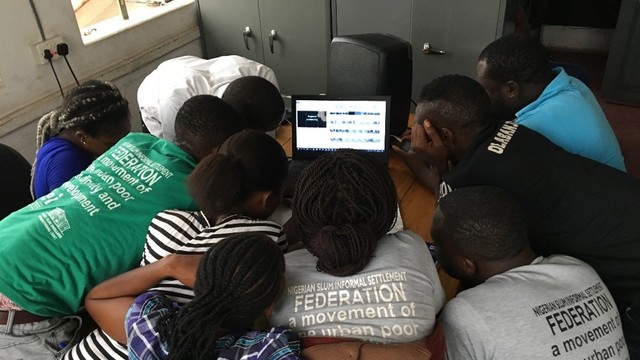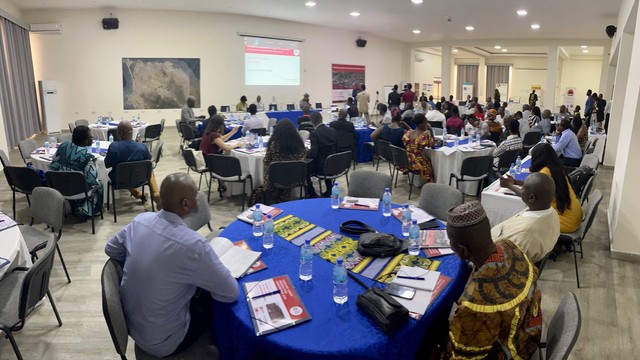Introduction to housing justice
IIED’s programme of work on housing builds partnerships and research that informs community-led and resilient housing responses in cities of the global South.

A house in stilts above the water in Banjarmasin, Indonesia (Photo: Alexandre Apsan Frediani, IIED)
Access to adequate and secure housing is key to advance people’s capabilities to live a dignified and flourishing life. In cities of the global South, continued evictions and lack of affordable and responsive housing initiatives are deepening housing injustices, in ways that are making cities more unequal and less resilient.
IIED is working with partners to generate awareness among policymakers and international development agencies about the fundamental role that housing plays in advancing social justice, wellbeing and environmental sustainability.
This programme of work builds on the longstanding experience of IIED's Human Settlements research group in promoting housing approaches that are produced in partnership with the urban poor and their support organisations.
Alexandre Apsan Frediani and Evaniza Rodrigues of Uniao dos Movimentos de Moradia discuss how the work of IIED and its partners supports collective efforts and mobilisations that promote housing justice
This is important because the co-production of housing can generate solutions that meet local diverse needs and aspirations, while at the same time contributing to strengthen the capacity of urban communities to organise and participate in decision-making processes.
Our work has generated and disseminated in-depth knowledge about the particular dynamics affecting housing experiences of the urban poor living in informal settlements in cities across the global South, including dynamics related to tenure, finance, land, basic services and governance.
One key strand of our work has been to support and document community-led housing initiatives by organised groups of the urban poor, such as those by affiliates of Slum Dwellers International and the Asian Coalition of Housing Rights. This has enabled South-South exchanges among networks of civil society groups and organisations on social mobilisation strategies to access housing opportunities.
Our research has also focused on building the capabilities among governments and international development agencies to generate more responsive, collective and incremental housing approaches.
What has IIED done?
IIED has a long history of engaging with housing issues affecting the urban poor in cities of the global South. Our work and research on housing has been key to the development and implementation of global urban agendas, such as those promoted at the UN conferences on human settlements (Habitat I, II and III in 1976, 1996 and 2016).
Some of IIED’s recent housing work includes a project on ‘Shelter provision in east African cities’ (2017-2020), which has shed light on the power structures shaping urban poor’s access to housing in Nairobi, Hawassa and Mogadishu.
This research has also captured, synthesised and disseminated lessons from particular housing policy and practices, such as the Special Planning Area (SPA) in Nairobi, and the responses to shelter needs of particular vulnerable groups in Mogadishu.
IIED was commissioned by United Cities and Local Governments to produce a global ‘Rethinking Housing Policies’ (PDF) report in 2019 that brought to the forefront the key role that local and regional governments play in addressing housing needs.
Furthermore, in the two special issues of Environment and Urbanization on housing published in 2020, IIED explored the various agendas associated to housing and mechanisms to access adequate housing. The different contributions have addressed issues such as struggles against eviction, incremental and government-led housing production, land disputes and informal land investments and rental housing dynamics.
Meanwhile, housing has been a cross-cutting topic approached by the other areas of work in the institute. Issues around tenure security are a vital component of urban crises and urban displacement, while work to improve urban health has highlighted the key role that housing plays in terms of health and wellbeing, especially during the COVID-19 pandemic.
The work on ‘urban risk and urban crises responses’ also addresses issues related to housing through issues associated to community-based adaptation embedded in incremental housing strategies and the potential threat of evictions caused by risk-based discourses.
What is IIED doing now?
In 2021, IIED is supporting the Sierra Leone Urban Research Centre to develop and disseminate a participatory methodology for informal settlement upgrading in Freetown. This is part of wider research under the ‘Knowledge in Action for Urban Equality’ programme led by the Bartlett Development Planning Unit of UCL.
IIED has also started an exciting five-year project involving municipalities in Mexico, Brazil and Argentina. The ‘Transformative urban coalitions: catalysing urban partnerships to drive systemic transformation towards sustainability’ project will promote housing and informal settlement upgrading approaches that build decarbonisation pathways while also advancing social justice.
Furthermore, IIED will continue to participate in and support the activities of international networks of civil society groups advocating for a more socially and environmentally-just housing agenda.
This includes events such as a webinar on housing rights (in October 2020) that brought together representatives from a number of international networks including Slum Dwellers International, Asian Coalition for Housing Rights and Habitat International Coalition.
Additional resources
Towards housing justice, Alexandre Apsan Frediani, Camila Cociña (2023), Project flyer
Acquiring housing – understanding outcomes, improving choices and 'leaving no one behind', Sheridan Bartlett, Diana Mitlin (2020), E&U Briefing
Getting housing back onto the development agenda in the time of COVID-19, David Satterthwaite (2020), E&U Briefing
Contact
Alexandre Apsan Frediani (alexandre.frediani@iied.org), principal researcher, IIED's Human Settlements research group




